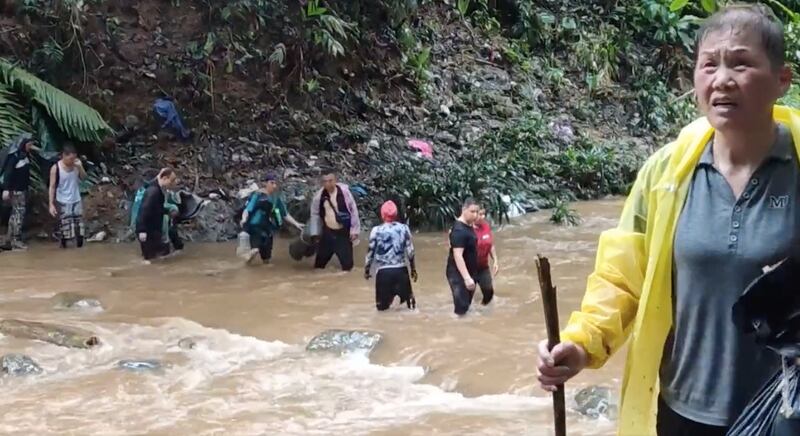Performance artist and social media personality Chen Shaotian, also known as Brother Tian, is hoping to apply for political asylum in the United States this week after documenting his hazardous trek through the Central American rainforest.
"Ladies and gentlemen! I have arrived in Quito!” the bearded, cigarette-smoking Chen tells his online audience in a video clip dated May 17 as he arrived in the Ecuadorian capital to embark on the overland leg of his journey to the United States, known in China as "walking the line."
Chen, who has previously served a 14-month jail term for criticizing the Chinese Communist Party on social media, proceeded to upload video clips along every stage of his trip, including a hazardous trek led by people-smugglers across a rainforest that took two days.
"I was lucky – it took some people four-and-a-half days," Chen, who also sports a massive medallion emblazoned with the Chinese character for "dream," a likely satire on President Xi Jinping's slogan "the Chinese dream," said after emerging from the jungle.
"One old lady had to be carried out of there on a stretcher after paying US$120 to the snakehead [people smugglers]," he said.
‘From all over the world’
Tian arrived in Quito via Turkey, joining around 200 other fellow travelers from China who had chosen to "walk the line."
"There were families, single people, from Fujian, Shandong … Xinjiang, people from all over [China]," he said. "There were also ... people from all over the world."
Chen's trip took him through bus stations, border checkpoints, refugee camps and other facilities that have sprung up to serve the constant stream of people heading for the United States through Central America.
“We ran into some corrupt police en route between Quito and Colombia, Nicaragua,” he said. “They wanted money from us … There were six of us Chinese, and we each gave them US$500.”
Chen said he was offered the option to pay US$1,100 more for a "luxury" route during which horses and camps were provided, as opposed to camping in the rainforest.

He said a lot of people were robbed along the way.
"Some people had more than US$1,000 stolen," he said. "They told me there would be more robberies in Guatemala and Honduras, and some were saying that the Chinese were partnering up with the locals to rob [Chinese refugees]."
"They go for people with families – one guy had his credit card swiped and lost more than 200,000 yuan, (US$28,000)" he said.
The route Chen took, flying to Turkey, then to Ecuador, then northwards along the coast through Peru and Venezuela, is a common one. Many of Chen's videos showed long lines of people lining up for buses, or to be admitted into refugee facilities along the way.
Freedom to speak out
Chen said he is hoping to apply for political asylum in the United States for one reason only: to live somewhere where there is freedom of expression.
He was jailed in March 2021 by a court in his home province of Henan after being found guilty of "picking quarrels and stirring up trouble," a charge frequently used to target critics of the regime.
Chen's sentence was based on more than 50 posts he made to Twitter that were deemed to be "hype about major sensitive events in China" and "political attacks."
One video showed him astride a moped, speeding down a road wearing a face-mask blazoned with the words "evil" and "understand," and yelling: "Understand this! Our evil government is far worse than any virus!"
Chen's tweets had "attacked China's political system, insulted employees of the state, caused serious damage to China's national image and endangered its national interests," as well as "creating serious disorder in a public place," the court judgment said.
Translated by Luisetta Mudie. Edited by Malcolm Foster.
